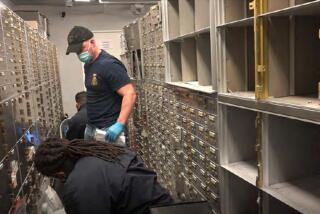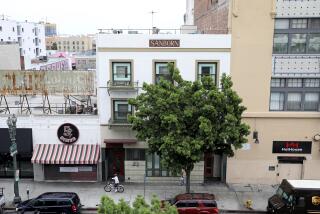Precious Metals Firm Put in Receivership
- Share via
A Laguna Hills precious metals company was ordered into receivership late Thursday by a federal judge at the request of the Commodity Futures Trading Commission and the state of California. The government agencies contended that First American Currency Inc. was selling illegal off-exchange futures contracts.
U.S. District Judge David V. Kenyon appointed a receiver one day after 35 U.S. Postal Inspectors seized First American’s books and records. Kenyon had previously frozen all of the firm’s bank accounts and the accounts of company officials and their wives.
First American attorney Alan Weil called the court’s action “Draconian relief.”
“I think the company could satisfy every financial obligation if the freeze order is lifted,” he said. Customers will lose their money if the firm is closed, he added.
Kenyon appointed John W. Cotton, former chief of the CFTC’s enforcement division who is now in private legal practice, to serve as receiver.
The company, which has about 1,000 customers across the country, had $13 million in assets in April, according to a financial statement read in court, but, as of Thursday, government attorneys said, they had located only $600,000.
“We can’t find the money,” said Arthur Salzberg, regional counsel for the CFTC, a federal agency that regulates commodities transactions. CFTC attorney Karen Rooney told Kenyon that First American had no precious metals stored at its offices and no records of metals being bought for customers.
“There is no evidence that First American Currency has ever been in a position to honor its customer obligations,” Rooney said. She said the company claims that it is solvent, but the records seized Wednesday do not back that up.
According to the CFTC complaint filed in court, company officials allegedly used customers’ money to operate the business. The complaint also alleges that First American failed to keep adequate books and records of customer transactions.
Salzberg said the CFTC learned in April that about $3 million had been transferred to Allen W. Lloyd & Associates, a Panamanian company controlled by First American’s president, Gilbert Traylor, and company secretary Eric Kuvet. He said the commission expressed concern about the transfer of funds to company officials at the time.
Traylor and Kuvet were previously employed as salesmen for Brazier Corp., a Newport Beach precious metals company placed into receivership and ordered liquidated at the request of the CFTC in 1984, according to Salzberg.
Kenyon set a Dec. 13 hearing on First American’s status.
More to Read
Inside the business of entertainment
The Wide Shot brings you news, analysis and insights on everything from streaming wars to production — and what it all means for the future.
You may occasionally receive promotional content from the Los Angeles Times.










